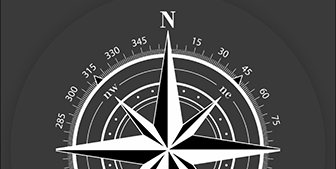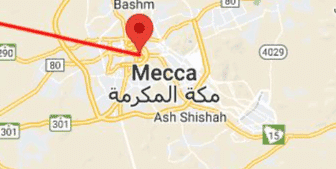Qibla Direction
Qibla is an arabic word (pronounced: ˈkɪblə) which means direction. In muslim jurisprudence, Qibla is the direction towards the Kaaba, towards which Muslims face five times every day to offer their daily prayers (salah). On Allah’s command, the Qibla changed from Bait-al-Maqdas to Kaaba on Thursday, 16 Muharram 1445 AH. Being the oldest center of monotheism, the Kaaba dates back to the time of the Prophet Ibrahim عَلَيْهِ ٱلسَّلَامُ and his son Isma'il عَلَيْهِ ٱلسَّلَامُ and holds significant historical and spiritual importance in Islam. It was built by the aforementioned Prophets under the explicit command of Allah سُبْحَانَهُ وَتَعَالَى. It is located within the Masjid al-Haram in Makkah, Saudi Arabia, and is the holiest site in Islam.
For Muslims, the Kaaba represents the spiritual center of their faith, signifying the unity of the ummah (Islamic community) and their commitment to submission to Allah's will and the reason behind Muslims having to face the Qibla while praying is a simple unifying act of the Muslim Ummah. Known to be the first site of worship on the face of the earth, the significance of facing the Qibla whilst praying has been reiterated time and again in both The Quran and Hadith was something practiced by the Prophet Muhammad ﷺ himself. The Kaaba helps Muslims feel a sense of connection and belonging to their Muslim brethren while praying despite geographical and cultural differences. The Quran says:
وَمِنْ حَيْثُ خَرَجْتَ فَوَلِّ وَجْهَكَ شَطْرَ الْمَسْجِدِ الْحَرَامِ ۖ وَإِنَّهُ لَلْحَقُّ مِنْ رَبِّكَ ۗ وَمَا اللَّهُ بِغَافِلٍ عَمَّا تَعْمَلُونَ
At whatever place you may be, turn your face towards Masjid Haram (at Prayer time), for this is, in fact, a Commandment of your Lord, and Allah is not unaware of what you do. Al-Baqara (2:149)
How is Qibla Direction Determined?
Knowing the right direction of Qibla is of utmost importance and is fairly easy for someone to know in their household or local areas. But it can be somewhat tricky for someone who happens to be in a new region or for someone who is always traveling.
There are multiple ways to determine Qibla direction, such as using the compass or online websites and applications are relatively easy and reliable options. Whereas one can also determine the Qibla direction with the help of Sun positioning, mosque minarets with markers, or asking the locals; however, these alternatives are somewhat inaccurate.
Using a compass:
- Hold the compass flat in your hands and make sure there are no metal objects that may affect the correct operation of the compass or an object producing magnetic fields.
- The red end of the needle typically points north. Turn yourself so that the red needle coincides with the north (N) in the compass housing.
- Find the Qibla angle from the north (N) in the compass housing for your place or city. This should provide the direction of Qibla for your prayer.
- Keep in mind that Qibla's direction can vary slightly based on the specific location and the magnetic declination in that area.
Using an online Qibla locator app:
- Open a Qibla locator website or download an app.
- Allow location services for accurate determination of the Qibla direction according to your location.
- Once the locator has done its job, it will display the direction of the Kaaba in the form of an arrow or map.
- This should be your direction to face while praying.
Comparing the process of both methods, one can easily confirm that finding the direction of Qibla using modern technology, as in websites and apps, is much more convenient and accurate. These apps use modern techniques such as GPS, using specific geographical and magnetic data of a user's location as well as accounting for the Earth's rotation to provide the user with accurate, reliable, and instant information about the Qibla.
Find the Qibla with the Muslim & Quran App
Since it has been established that using modern-day applications has made locating the Kaaba the utmost convenient and quite accurate, let’s see how anyone can find the Qibla direction using the Muslim and Quran app in this step-by-step guide:
- Download the Muslim and Quran app from your local mobile app store
- Open the app where it’ll ask you for permission to access your location
- Once this is done, you will be greeted by a very creative and inclusive interface indicating the next prayer time with a timer along with the current Islamic date.
- At the bottom left will be a small compass indicating the direction of Qibla.
- You can also open an individual Qibla Direction interface by clicking on the option when you swipe below or from the menu bar in the top left corner.
- The individual interface tends to be extremely detailed, with a map showing a tracked line from your location to the Kaaba. Below the map is a large compass with the direction of Qibla.
- Also, you can change the theme of the compass and have a pretty creative ‘Augmented Reality’ feature.
- Amongst the plethora of other options, you can access prayer timings for your specific location, Digital Quran, Hadith Collection, Duas, Islamic Calendar, Tasbih, Salah Guide, the 99 names of Allah سُبْحَانَهُ وَتَعَالَى, Islamic places and many other features.
Muslim and Quran Online Qibla Direction - Notable Features
The most brilliant feature of the app is, by far, the accuracy and convenience it provides the users, along with a brilliantly designed creative interface. Any individual, be it someone familiar with mobile apps or not, can access this app with no difficulty whatsoever and easily find the Qibla direction.
The user can also make use of a wide range of other features that will surely help in the practicing of one's religion. Plus, a huge benefit lies in the ability of the app to provide you with maximum functionality and features even if you do not have wifi or data access.

